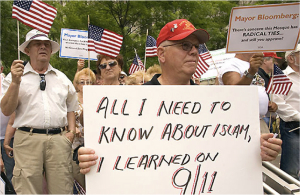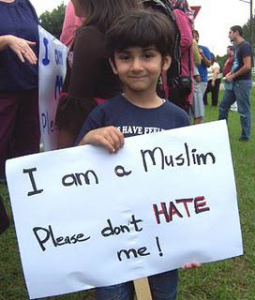From: Daniel Buttry
To: Charisma Media
Jesus said if you want to remove a splinter from your neighbor’s eye you must first remove the beam from your own. As a community of Christian Pentecostals and charismatics around Charisma magazine we need to practice the teaching of Jesus in a profound communal and public way now.
Charisma published an article online by Gary Cass titled “I’m Islamaphobic, Are You?” that said that all Muslims stand for the killing of Christians and that Mohammad taught and modeled that approach. Cass called for Christians to engage in holy war against Islam, including deporting all Muslims from the United States. The resulting furor caused Charisma to take down the article from the website, but that is merely a worldly form of responding to criticism. We need to exercise in the Christian community a response to the Holy Spirit’s work of refining the church through conviction of sin, calling to repentance, and calling to a life faithfully following our Lord Jesus Christ.
 Today there is great concern over the rise of militant Islam, and rightly so. We have seen many situations around the world in which Christians have been victims of persecution, in which Christian churches have been bombed, in which Christians have been threatened with execution unless they convert to Islam, and so on. I have personally been to many of those places and have first-hand knowledge. The recent news about ISIS (or ISIL—same organization with different translations of their name, or the shortened IS for Islamic State) and their treatment of the Iraqi Christian community has stirred concern and debate.
Today there is great concern over the rise of militant Islam, and rightly so. We have seen many situations around the world in which Christians have been victims of persecution, in which Christian churches have been bombed, in which Christians have been threatened with execution unless they convert to Islam, and so on. I have personally been to many of those places and have first-hand knowledge. The recent news about ISIS (or ISIL—same organization with different translations of their name, or the shortened IS for Islamic State) and their treatment of the Iraqi Christian community has stirred concern and debate.
But what should be a Christ-centered Spirit-filled response? The Apostle Paul called for us to test what is said even under supposed divine inspiration: “But test them all; hold on to what is good, reject every kind of evil” (1 Thessalonians 5.21,22). In the article published by Charisma we do not see an isolated expression by one Christian but a view and attitude expressed in much of Christian media and by many Christians in the churches, including and especially in charismatic and Pentecostal circles. Many of us feel that there are severe spiritual problems with this approach and are calling for discernment in the Spirit, repentance, and change of behavior to be consistent with the Spirit of Jesus. Because this sin has been publicly expressed, our rejection of the sin and commitment to following the way of Jesus needs to be publicly expressed, including by Charisma.
Why is that article wrong? First it is factually wrong and broke one of the Ten Commandments. We are commanded, “Do not bear false witnesses against your neighbor.” Statements were made about Muslims that are false. Cass wrote, “History shows where Muslims get the power and means to subjugate and behead Christians, Jews, et al, they do it.” This is false. Sometimes it happened, but such actions also happened in many Christian communities to Jews, Muslims, and Christians of other convictions than the dominant group. During many periods of history Muslim cultures have been relatively tolerant of religious minorities and at times have even received religious refugees from Christian lands. When Christians took over Moorish Spain, which had often been a center of religious tolerance, many Jews fled to Egypt where they found safety from the Christian Inquisition. During the Holocaust of World War II, besides Christian figures aiding Jews (like the Ten Boom family and Dietrich Bonhoeffer), there were Muslims in Albania, France and Bosnia who also protected Jews.
Cass writes: “ISSA (sic—often referred to as ISIS or ISIL) is doing to America[n] journalists what every true follower of Mohammed wants to do to you and yours; subjugate or murder you.” This is false unless Cass is defining “true followers of Mohammad as the extremist minority rather than the vast majority of Muslims around the world and in the US. This approach would mean that Muslims who think the only true Christians are those who butcher Muslims in Bosnia or kill blacks in apartheid South Africa or Jim Crow US are correct in their thinking. To say that ISIS represents all Muslims is as false as saying the KKK represents all Christians. I personally know many Muslim imams, and they all categorically and publicly reject ISIS in their portrayal of Islam and in their violent actions. They have released public statements about this. I live in a city with a huge Muslim population and have many Muslim neighbors I know well. None of them—not one—is how this article portrays them to be!
Check out
“What Are Muslims
Saying About Isis?”
Part of the truth is that the global Muslim community has as much diversity as the global Christian community. ISIS has killed more Muslims than Christians. This is true not only about ISIS but other violent militant expressions of Islam such as Boko Haram in Nigeria.
Cass’s statements reflect either ignorance or deliberate lies. To publish such statements in Charisma is to participate in either ignorance or deception. With conflict between Christians and Muslims being such a major issue in the world, such ignorance or moral failure is a failure on a massive scale. Ignorance or lying like this can lead to policy decisions that cause people to die, that hinder the mission work of the church, and that lead to catastrophic damage that takes decades if not generations to undo. Bearing false witness, breaking one of the Ten Commandments, in a supposed moral cause fundamentally undermines the morality of a campaign. Christians in the US, Charisma, and the author of this article need to repent of bearing false witness against our Muslim neighbors.
Second, we need to reject the approach in the article on missional grounds. Christians need to love Muslims, not fear and hate them. Why? Because Jesus loves Muslims! God loved the whole world so much he sent Jesus. There is not a Muslim exclusionary clause in John 3:16. The Great Commission tells us that we are sent into the world to be Christ’s witnesses and to make disciples of all nations. Christians have a missionary mandate—and so do Muslims. That creates a clash of faiths, which has often been violent on both sides. How do the two largest religions in the world, both with a missionary mandate, compete without violence? Most Muslims claim that Islam is a religion of peace, and we Christians speak about peace in our faith (“peace on earth” proclaimed at Jesus’ birth, peace as a fruit of the Spirit, etc.). Yet violence has so often been the language of our inter-religious discourse, an approach explicitly called for by the Charisma article.

How can we show the love of the Father in the person of Jesus Christ through the power of the Spirit with hatred in our heart? This is a fundamentally flawed missiological approach. It is impossible. Our attitudes are blocking the expression of the love of Christ and are therefore working against God.
I have personally experienced a charismatic person angrily shaking a finger in my face while saying that he loved me and was thus warning me about how God was going to open the earth to swallow me like the sons of Korah. Did I feel loved by him? No. I felt his hatred. The man was mentally ill, I think, but his inconsistent verbal and emotional expression is frequently seen in Christian media, especially in reference to Muslims. How can Muslims know God loves them when they hear Christians hating on them, distorting the religious teachings they hold dear, and saying things about them they know to be false?
If we are truly filled with passion for fulfilling the Great Commission we need also to clearly and consistently express the love that was shown by the Father in sending Jesus. We need to speak the truth clearly—the truth about Jesus and the truth about our neighbors near or far—but we must speak the truth in love or we fundamentally fail in modeling the truth about the love of God in Jesus.
Some Christian martyrs have done this in ways that have challenged their oppressors—Stephen in relation to Saul of Tarsus is the first example. There are so many examples of martyrs who have made this loving witness. We denigrate the martyr’s faithful witness when we speak hate, falsehood, and fear and then broadcast that to the larger world through our media channels. Furthermore, such expressions are often done from places of safety, putting at risk our sisters and brothers who live in the countries most affected (whether indigenous or foreign) and who become much easier targets for extremists inflamed by our media.
We call for repentance from expressions of fear and hate toward Muslims. But what’s needed even more than that is to plead for the Holy Spirit to infuse us with love for our Muslim neighbors, with the spirit of peaceableness (which we are to have with all people, according to Romans 12.18), with self-control over our tongues when our hearts are broken over the violence suffered by our sisters and brothers, and with gentleness. We need to pray that the Spirit would enable Jesus to shine through us.
What is the nature of Jesus that we are commanded to show as his disciples? We are called to love our enemies. Actually, more than that. We are commanded to love our enemies.
Historian Michael Hart wrote The 100: A Ranking of the Most Influential People in History. He ranks Mohammad as #1, much to the delight of Muslims, and Isaac Newton is ranked #2. Jesus is ranked #3 by Hart, a historical ranking rather than one based on religious truth or issues such as salvation, heaven and hell, etc. Hart’s reasons for ranking Jesus #3 are telling. Jesus as the founder of Christianity obviously has had a huge impact in history. However, as Hart goes through the teaching of Jesus he finds the command to love one’s enemies as something that had never before been seen in religious teaching. The problem is that Christians don’t follow that teaching, expect anybody else to follow it, or teach their children to follow it. So Hart concludes that Jesus’ most unique ethical teaching is at best an untried suggestion. Jesus comes in third on the influential list not because of anything he lacks but because we Christians do not follow the clear command of the one we call Lord. Jesus has not influenced us sufficiently. Argue with Hart if you will, but I offer Cass’ article in Charisma in support of Hart’s thesis.
Interestingly, the early history of Pentecostalism bears witness to love of enemies as being part of what the Holy Spirit was doing in that early movement. Most of the early Pentecostal leaders were pacifists, rejecting participating in violence of any kind. The Assemblies of God (celebrated in a recent issue of Charisma for their 100th anniversary) was a peace church with an official pacifist position through World War II, though admittedly many members’ practice was not in line with that official position. The AG’s pacifist position was officially overturned in 1967 during the Vietnam War. But part of the early Pentecostal witness was against war. What would be the impact in the world if Pentecostals across the globe returned to those roots?
Jesus said, “Judge not lest you be judged” and “by the standard you judge you will be judged.” Cass wrote a book called Christian Bashing. One might think that his awareness of what it feels like to have one’s faith denigrated would cause him to be more honest and caring in how he approached others. Evidently not. He engages in full throttle Muslim bashing, undercutting his right to speak out about Christian bashing. Jesus said, “Do unto others as you would have them do unto you.” This is simple basic Christian discipleship. Cass needs to start there, as should Charisma. Let us treat Muslims with the same standard we want to see Christians treated around the world. Do we want Christians expelled from Iraq or Syria? If not, we shouldn’t be calling for Muslims to be expelled from the US. If we don’t want others interpreting the most violent passages of the Bible to show that all Christians are violent, we shouldn’t make definitive interpretations of the Qur’an that many Muslims reject as completely missing the context. Let’s do unto others as we would have them do unto us.
So I urge Charisma to do the following in response to the convicting work of the Holy Spirit:
- Refuse to publish anything more from Gary Cass until he publicly repudiates in specific detail what he specifically and publicly said.
- Publish articles and editorials from credible Christian leaders that show a more Christ-centered, Spirit-filled, Scripture-rooted, and missiologically-oriented approach to Muslims and Islam.
- Open up to dialogue about some of the issues that have blinded the Christian community, especially Pentecostals and charismatics to issues of justice and peace, including whole-hearted, uncritical acceptance of Christian Zionism, which interestingly is based on Dispensationalism, a questionable biblical hermeneutic which has often been used to reject and even demonize Pentecostalism. That same theology has resulted in a watering-down of the impact of the ethical teaching of Jesus in the Gospels, consigning it to a different dispensation.
- Explore the pacifist roots of Pentecostalism, and publish stories of Pentecostals and charismatics involved in ministries of making peace, building justice, and working for reconciliation among people.
Let us meet our Muslim neighbors with love of God, the teachings of Jesus, the healing power of the Holy Spirit, and neighborly love.
Sincerely yours in Christ,
Daniel L. Buttry
Daniel L. Buttry is the author of Bringing Your Church Back to Life: Beyond Survival Mentality (1988), Christian Peacemaking: From Heritage to Hope (1994), Peace Ministry: A Handbook for Local Churches (1995), and First-Person Preaching: Bringing New Life to Biblical Stories (1998), all from Judson Press; Interfaith Heroes (2007), Interfaith Heroes 2 (2009), and Blessed Are the Peacemakers (2011), all from Read the Spirit Books; as well as Peace Warrior: A Memoir from the Front (2013), from Mercer University Press.


